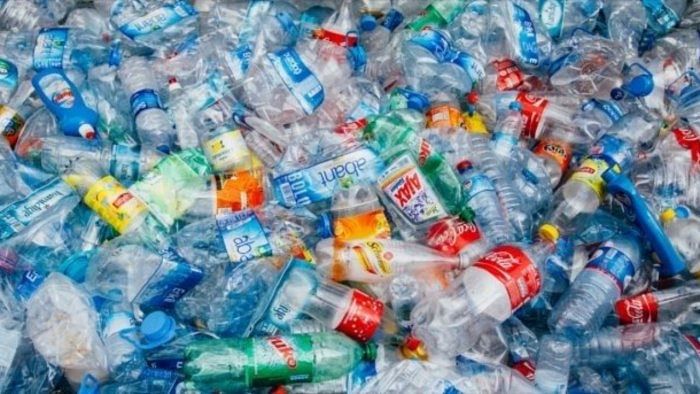
Bengaluru banned single-use plastics in 2016, with the Bruhat Bengaluru Mahanagara Palike launching awareness drives and punitive measures. While the level of awareness rose in the city, the Covid-19 pandemic derailed the efforts, as single-use plastic re-entered the market in the form of packaging and disposable items.
In 2022, the Union government banned a range of plastic items from use and sale across the country. Banned items included earbuds with plastic sticks, plastic sticks for balloons, plastic flags, candy sticks, ice-cream sticks, thermocol for decoration, plates, cups, glasses, cutlery such as forks, spoons, knives, straws, trays, packing films around sweet boxes, invitation cards, cigarette packets, plastic or PVC banners less than 100 microns, stirrers and more.
Also Read | In Venice, Americans explore peace with plastic
With this, the BBMP swung into action once again. Marshalls started seizing supplies and penalising those who sell items in plastic bags and those who sell banned items. Big supermarkets and shops started charging for bags and supplying items in alternatives.
A note given by the BBMP says that the plastic collected in two streams—by routine door-to-door collection and by seizures—is handed over to dry waste collection centres which are linked to recycling units. About 600 tonnes of plastic waste is generated daily through BBMP’s dry waste collection centres (DWCCs). Approximately 500-550 kg of plastic is being seized per day by BBMP staff and handed over to recycling units.
Problems in implementation
While on paper, the implementation looks good, there are many gaps. Padmashree Balaram, President of Koramangala 1st block Resident Welfare Association, points out some of them.
“These days more people are aware of cloth bags than before the ban. People carry bags to shops voluntarily. Big shops charge for bags and do not sell plastic bags,” she says. She warns about buying new cloth bags each time, as the principle of reusability goes for a toss each time a cloth bag is bought.
But, “The city still sees a lot of low-micron plastic bags with vegetable and flower vendors. But we cannot penalise them,” she adds. Vendors are forced to give stuff in plastic bags because customers demand it many a time. The lack of availability and high cost have also made it difficult for people to switch to alternatives.
Colonel Rajbir Singh, chief marshall officer, BBMP, agrees that putting a fine on vendors is not the solution. “Fining small-time footpath vendors would affect their livelihood,” he says.
Single-use disposable paper cups are a bigger problem in the fight against plastic pollution. Used everywhere - from weddings to parties to hotels, these contain a layer of plastic that is not separable or recyclable. It ultimately gets burnt emitting harmful dioxin gases or goes to landfills generating microparticles that end up in soil and water. “Many big shops give such cups in very sustainable packaging, which is meaningless,” says Padmashree.
Some alternatives are sustainable or better than plastic but the situation has scope for improvement. “Areca plates are compostable but steel plates and banana leaves are always better than them,” Padmashree says, explaining that composting areca plates is difficult if they are not shredded, and food waste makes the process of composting in large quantities a painful process.
Polypropylene bags that look like cloth bags are given in many shops. “The propagation of polypropylene bags should be stopped. It is easily confused for cloth by people who take it. This is neither recyclable nor compostable. It is reusable but not durable. It has to be incinerated or should be sent to landfill, and will remain uncomposted for years,” she says.
She adds that plastic manufacturing factories must be closed.
BBMP’s challenges
Last year, BBMP marshals raided and closed four plastic manufacturing units and seized close to a tonne of plastic bags. Godowns in K R Market and Kalasipalya were raided and plastic bags were seized. From September 2019 to April 2023 BBMP collected a fine of Rs 2.36 crore in 50,162 cases. Approximately, 71 tonnes of plastic has been seized in the last three years.
The BBMP note says the supply sometimes comes from Tamil Nadu and Gujarat, which has become a challenge. In addition, unauthorised manufacturing units located outside BBMP jurisdiction pose more challenges, as closing them is beyond BBMP’s control. BBMP has not been able to fully stop the bulk supply yet.
Garbage fires are another problem in beating pollution. Unsegregated garbage dumped in blackspots is set on fire sometimes, causing pollution. While such incidents have become fewer compared to previous years, controlling them in the vacant/disputed sites remains a challenge.
The creation of processing facilities on par with population growth in the fastest-growing city is yet another challenge. Bengaluru hosts more than a crore people today but has just 124 dry waste collection centres. Landfills are the prominent solution for mixed waste that includes plastic, while the city is struggling to process the wet and dry waste generated.
Solutions
While the BBMP says DWCCs send plastic waste to cement factories, in reality, a large quantity of single-use plastic still ends up in landfills. The BBMP aims to fix the issue with segregation at source, the establishment of DWCCs in all 243 wards as opposed to 124 DWCCs existing now and penalising the offenders.
Mansoor Gous, Hasiru Dala says that in his dry waste collection centre in Pattabhiramanagar, he receives 2.5 tonnes of dry waste, out of which 60% is multilayer plastic (mainly food and fast-moving consumer goods packaging), thermocol and furniture etc.
“We manufacture sheets and boards using multilayer plastic in one of our plants. Earlier the MLPs were sent to cement factories but now it is used in another format,” he says, adding that 1% of the plastic waste is non-recyclable and goes to landfill.